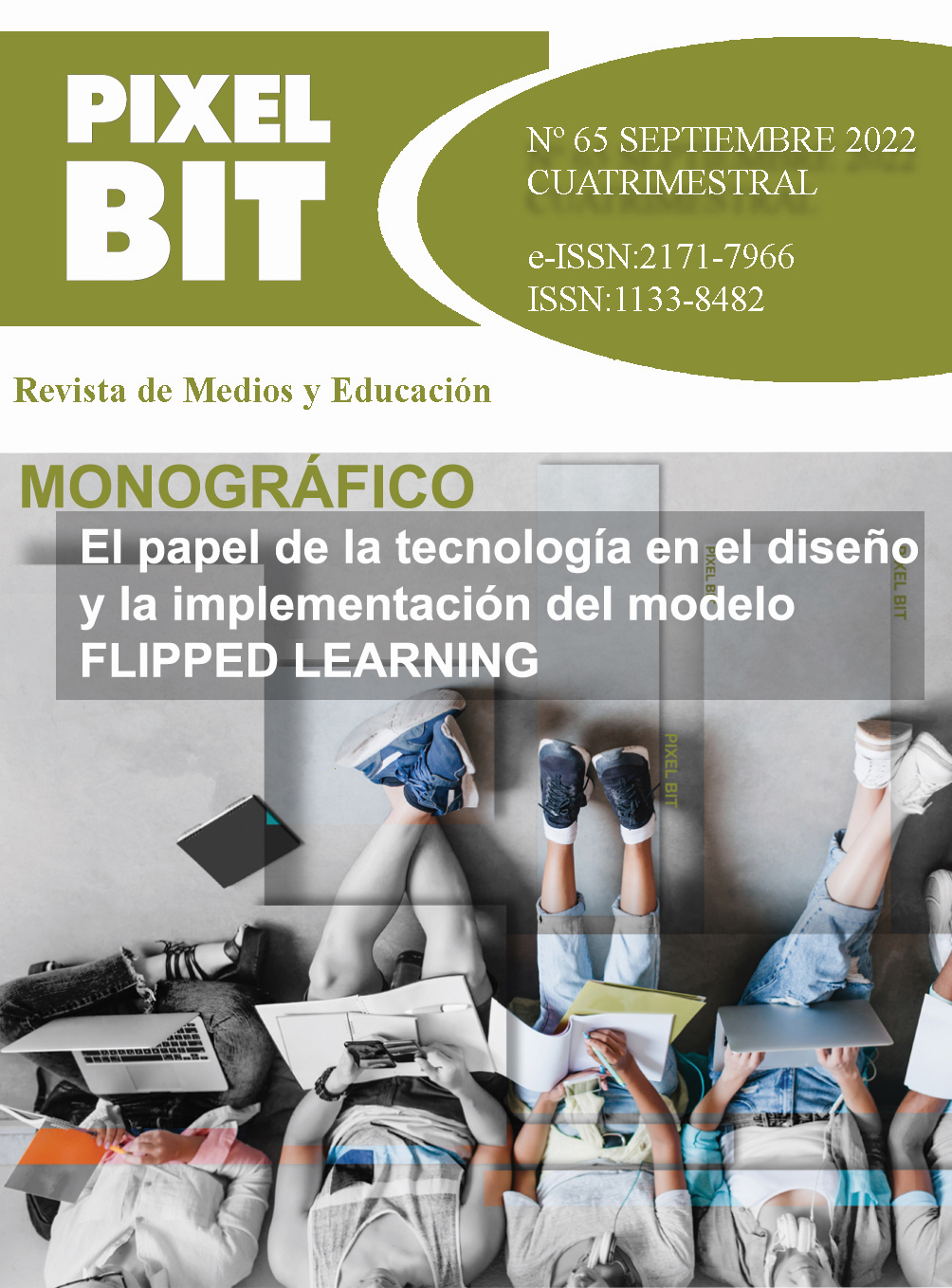Resumen
As perceções dos alunos face à aprendizagem remota referem aspetos negativos relacionados com o suporte insuficiente dos professores ou a falta de motivação. Porém, a aplicação do modelo Flipped Classroom (MFC) apresenta efeitos positivos nos resultados de aprendizagem cognitiva, nos níveis de motivação, satisfação e autonomia dos alunos. Este estudo teve como objetivo analisar as perceções dos alunos do ensino secundário português acerca da experiência de aprendizagem no MFC, em contexto online, e relacioná-las com indicadores da experiência de aprendizagem. Utilizou-se uma abordagem de métodos mistos com recurso a um questionário e a entrevistas grupais que possibilitaram uma maior compreensão da influência das características do modelo na experiência de aprendizagem dos alunos. Os resultados mostraram que a característica do MFC mais valorizada foi o envolvimento dos alunos no processo de construção de conhecimentos. Revelaram uma correlação positiva entre as características do modelo e os indicadores da experiência de aprendizagem e destacaram o papel do professor na estratégia motivacional da promoção da autonomia. Concluiu-se que quando existe um design estratégico dos conteúdos suportado pelas interações com os pares e pelo feedback do professor, a implementação online do MFC cumpre as “necessidades” motivacionais dos alunos para se envolverem na aprendizagem.
Citas
Bergmann, J., & Sams, A. (2012). Flip your Classroom: Reach Every Student in Every Class Every Day. International Society for Technology in Education. International Society for Technology in Education World.
Bond, M. (2020). Facilitating student engagement through the flipped learning approach in K-12: A systematic review. Computers & Education, 151, 103819. https://doi.org/10.1016/j.compedu.2020.103819
Creswell, J.W. & Plano Clark V.L. (2013). Pesquisa de métodos mistos [Mixed methods research]. Penso.
Cohen, J. (1988). Statistical power analysis for the behavioral sciences (2nd edition). Lawrence Erlbaum Associates Inc.
Harris, C. (2021). The role of ‘Rich Tasks’ an interdisciplinary and digital approach to learning post COVID-19. Pixel-Bit, Revista de Medios y Educación, 61, 99–130. https://doi.org/10.12795/pixelbit.88209
FLIPPED LEARNING NETWORK (FLN) (2014). The four pillars of F-L-I-P. http://www.flippedlearning.org/domain/46
Fuchs, K. (2021). Innovative Teaching: A Qualitative Review of Flipped Classrooms. International Journal of Learning, Teaching and Educational Research, 20(3), 18-32. https://doi.org/10.26803/ijlter.20.3.2
Kim, M. K., Kim, S. M., Khera, O., & Getman, J. (2014). The experience of three flipped classrooms in an urban university: An exploration of design principles. Internet and Higher Education, 22, 37–50. https://doi.org/10.1016/j.iheduc.2014.04.003
Kostaris, C., Sergis, S., Sampson, D. G., Giannakos, M.N., & Pelliccione, L. (2017). Investigating the potential of the flipped classroom model in K-12 ICT teaching and Learning: An action research study. Journal of Educational Technology & Society, 20(1), 261-273. http://hdl.handle.net/11250/2479079
Lai, C.-L., & Hwang, G.-J. (2016). A self-regulated flipped classroom approach to improving students' learning performance in a mathematics course. Computers & Education, 100, 126–140. https://doi.org/10.1016/j.compedu.2016.05.006
Lai, H. M., Hsieh, P. J., Uden, L., &Yang, C.H. (2021). A multilevel investigation of factors influencing university students’ behavioral engagement in flipped classrooms. Computers & Education, 175, 104318 https://doi.org/10.1016/j.compedu.2021.104318
Lo, C. K., & Hew, K. F. (2017). A critical review of flipped classroom challenges in K-12 education: Possible solutions and recommendations for future research. Research and Practice in Technology Enhanced Learning, 12(4), 1–22. https://doi.org/10.1186/s41039-016-0044-2
Maqableh, M., & Alia, M. (2021). Evaluation Online Learning of Undergraduate Students under Lockdown Amidst Covid-19 Pandemic: The Online Learning Experience and Students’ Satisfaction. Children and Youth Services Review, 128, 106160 . https://doi.org/10.1016/j.childyouth.2021.106160
Reeve, J. (2009) Why teachers adopt a controlling motivating style toward students and how they can become more autonomy supportive. Educational Psychologist, 44(3), 159–175. https://doi.org/10.1080/00461520903028990
Ribeirinha, T., & Silva, B. (2021). The flipped classroom model potential in online learning: an assessment focused on pedagogical interactions. Publicaciones, 51(3), 295-345. https://doi.org/10.30827/publicaciones.v51i3.18076
Ryan, R. M., & Deci, E. L. (2000). Self-determination theory and the facilitation of intrinsic motivation, social development, and well-being. American Psychologist, 55(1), 68-78. https://doi.org/10.1037/0003-066X.55.1.68
Sergis, S., Sampson, D. G., & Pelliccione, L. (2018). Investigating the impact of flipped classroom on students' learning experiences: A self-determination theory approach. Computers in Human Behavior, 78, 368–378. https://doi.org/10.1016/j.chb.2017.08.011
Sun, J. C. Y., Wu, Y. T., & Lee, W. I. (2017). The effect of the flipped classroom approach to Open Course Ware instruction on students’ self-regulation. British Journal of Educational Technology, 48(3), 713-729. http://dx.doi.org/10.1111/bjet.12444
Tang, W., Hu, T., Yang, L., & Xu, J. (2020). The role of alexithymia in the mental healthproblems of home-quarantined university students during the COVID-19 pandemic in China. Personality and Individual Differences. 165, 110131. https://doi.org/10.1016/j.paid.2020.110131
Van Alten D.C.D., Phielix, C., Janssen, J., & Kester L. (2019). Effects of flipping the classroom on learning outcomes and satisfaction: A meta-analysis. Educational Research Review, 28, 100281. https://doi.org/10.1016/j.edurev.2019.05.003
Weiß, L.F, & Friege, G. 2021. The Flipped Classroom: Media hype or empirically based effectiveness? Problems of Education in the 21st Century, 79(2), 312-332. https://doi.org/10.33225/pec/21.79.312

Esta obra está bajo una licencia internacional Creative Commons Atribución-NoComercial-SinDerivadas 4.0.
Derechos de autor 2022 Pixel-Bit. Revista de Medios y Educación

